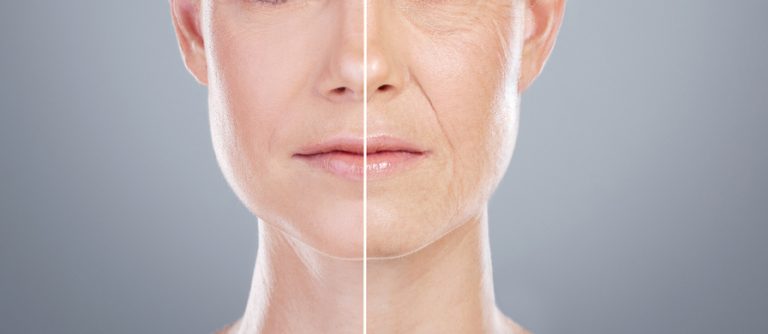How Menopause Affects Your Skin
You may be noticing changes, but what can you do to help improve your skin?

Menopause is all about change: your body, your emotions and mood and of course to your skin.
It is certainly most noticeable as we look at our faces every day, and menopause causes many changes to your skin.
It is inevitable that as we get older our skin is less resilient, but the dramatic hormonal changes during menopause can greatly accelerate this process in many ways.
Your wisdom and confidence hopefully increase, but the same isn’t true for many of your hormone levels.
Why your hormones affect your skin
The biggest changes typically occur when women are in their 40s and 50s, but they can begin as early as the mid-30s and continue into old age.
During menopause, lower levels of oestrogen have a big impact on your skin. Less oestrogen makes you prone to thinning, sagging, and wrinkling.
Also, your body stops making as much collagen as at menopause so there is a huge 30% drop within 5 years of menopause.
It’s not the only thing that decreases as you will also be producing much less of the growth factor IGF-1 which keep your skin supple and thick.
As you lose some fat under your skin then your skin’s elasticity drops and this combination of thinner and drier skin is much more prone to itching, irritation and bruising.
That, combined with dryness caused by hormonal changes, can cause sagging – especially around the neck, jawline, and cheeks – and fine lines and wrinkles.
Other key factors
It may not occur to you, but there are several things that can make a real difference to ensuring your skin is healthy, smooth and glowing.
1. Blood flow through the skin is reduced during menopause, so less nutrients and oxygen are available to nourish it.
This is important as it contributes to the thinning of the skin and a slower cell turnover rate, causing a reduction in the barrier function of the skin and more water loss, dry skin, lines and wrinkles.
2. Elastin is a protein that gives our skin its structure. It is crucial for providing the skin with resilience.
Without elastin, our skin would be saggy, wrinkly, and have no elasticity.
3. Melanin levels in the skin are regulated by our hormones, and menopause can upset this balance.
What this means is there is a greater sun damage risk, as well as age spots and skin blotchiness.
How to help skin at menopause
There are three things to remember to boost your skin: moisture, protection and nourishment.
Moisture: always use a skin routine that includes a mild cleanser instead of soap. For many women at menopause soap can be too drying.
Protection: Apply a specific, targeted serum, facial oil, and moisturiser for your skin type.
This helps to optimise your skins ability to deal with the hormone depletion and environmental pressures.
Nourishment: comes from both your skincare routine and your lifestyle choices around diet.
Exercise, enough sleep and good antioxidant support are all essential for this.
Hyaluronic acid occurs naturally in the skin, where it binds to water to help retain moisture but the natural ageing process can decrease its concentration.
Used on the skin it can be applied to help reduce fine lines, wrinkles and redness.
Helpful information:
Good skin is not just about dealing with the surface, you need products that go deeper to nourish and strengthen your skin. Wellsprings Bioidentical Face Serum has key elements to do that with progesterone, oestrogen and hyaluronic acid.
Diet is key, as you need one that promotes body and skin health. The Mediterranean diet is one of the best for this with its emphasis on eating a wide variety of fruit, vegetables, fish and olive oil.
If you are not an exercise fan it’s worth reconsidering as it helps skin in two ways.
It relieves stress and boosts circulation, and the extra oxygen and blood flow can help your skin look brighter and healthier.
Finally, menopause definitely disrupts sleep and it is vital as getting enough of it helps your skin look fresh and rested.
Lack of sleep can change your hormone levels and metabolism in many of the same ways that ageing does.
If you do not have sufficiently good hormone levels, that will definitely affect your sleep.
Progesterone is a natural relaxant to help aid sleep and lack or poor quality sleep definitely has a knock on effect on many of the functions of your body.
If you feel that sleep is an issue for you then this article will be helpful.
https://anna.blog.wellsprings-health.com/how-to-help-yourself-after-a-bad-nights-sleep/


















